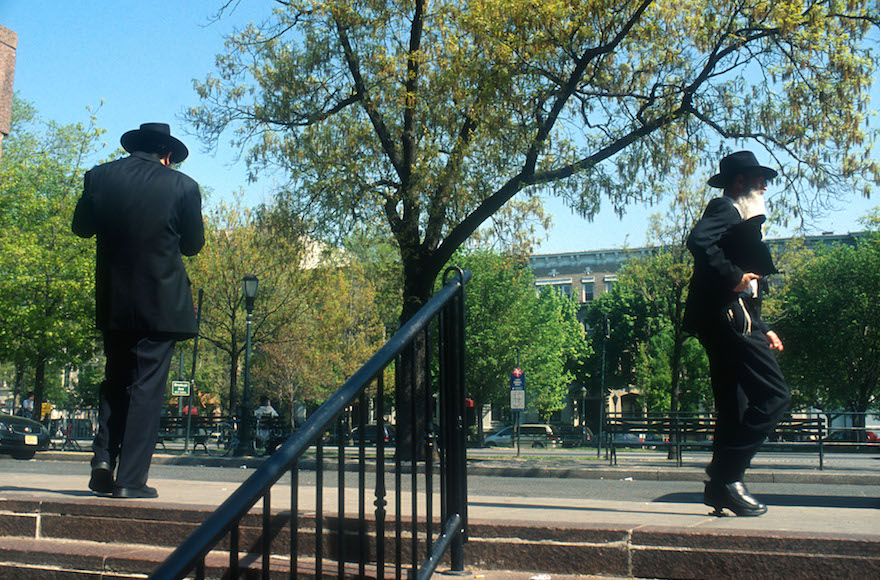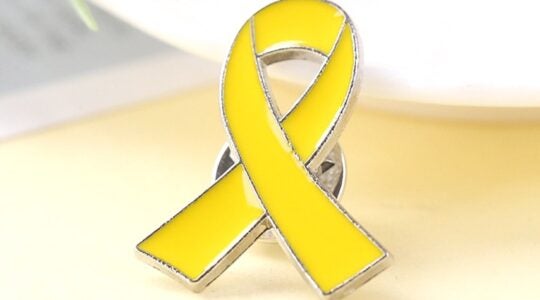(JTA) — Chabad-Lubavitch rabbis in the Crown Heights section of Brooklyn issued an edict to void the New York neighborhood’s new eruv — a symbolically enclosed area that allows observant Jews to carry objects on Shabbat.
The edict was published Friday on the news site COLive, which serves communities belonging to the Chabad-Lubavitch movement and other Hasidic streams. Authored by the beth din, or rabbinical court, of Crown Heights, whose members are Lubavitch, it concerns an eruv set up by a modern Orthodox Jewish community on the edge of the Brooklyn neighborhood.
The dispute is a sign of the demographic changes rippling through the Lubavitch stronghold of Crown Heights as more and more modern Orthodox Jews move into the heavily Jewish area, according to The New York Jewish Week.
In the absence of an eruv, some families refrain from leaving their house on Shabbat because they have no way of transporting infants, resulting in de facto curfews on weekends.
The new Crown Heights eruv was built privately this month and is a boon to members of Congregation Kol Israel, a largely modern Orthodox synagogue founded in 1924, according to The Jewish Week, because it increases sixfold the previous eruv area for that community.
The eruv is composed of fishing line that connects the tops of lampposts.
“I think it’s going to be tremendous for us,” Naftali Hanau, a member of Kol Israel’s eruv committee, told the weekly newspaper.
But Lubavitch tradition has different guidelines for building eruvs, including requiring the poles that hold the fishing line to be closer together and that large areas in the public domain, such as the Eastern Parkway thoroughfare, cannot be enclosed in an eruv. For some communities, an eruv can apply only in an area that can be physically cordoned off from the surrounding area.
Members of the Lubavitch community also feel the construction of the eruv was done without respect for a community and leaders who established the strong Orthodox presence in the neighborhood, and who stuck it out there in leaner economic times and in the wake of the 1991 riots there. After the riots, whose victims included an Australian Lubavitch man who was killed in an attack by a dozen or more African-American youths, the Lubavitch community worked successfully to improve relations with its non-Jewish neighbors.
“Recently, reports have proliferated about the supposed installation of an eruv by individuals qualified to do so,” the edict, signed by the Beit Din’s Rabbi Avrohom Osdoba and Rabbi Shlomo Yehuda Halevy Segal. “We hereby inform the public that, after investigating and looking into this issue, the reports are false and all those rabbis or expert eruv installers, whose names were tied to these reports, have testified before us that they did not assist the devastation of the Shabbat in our honorable neighborhood.”
Crown Heights, the edict also said, “does not have a kosher eruv in all its borders.”
Hanau, of the Kol Israel synagogue, told The Jewish Week that he has no intention of defending the eruv to its critics.
“We’re trying not to engage,” he said, stressing that anyone who doesn’t approve of the eruv doesn’t have to use it. “If you don’t like it, don’t carry,” he said.
JTA has documented Jewish history in real-time for over a century. Keep our journalism strong by joining us in supporting independent, award-winning reporting.






